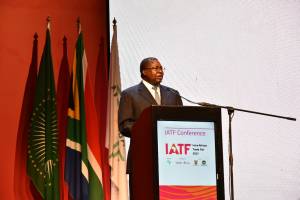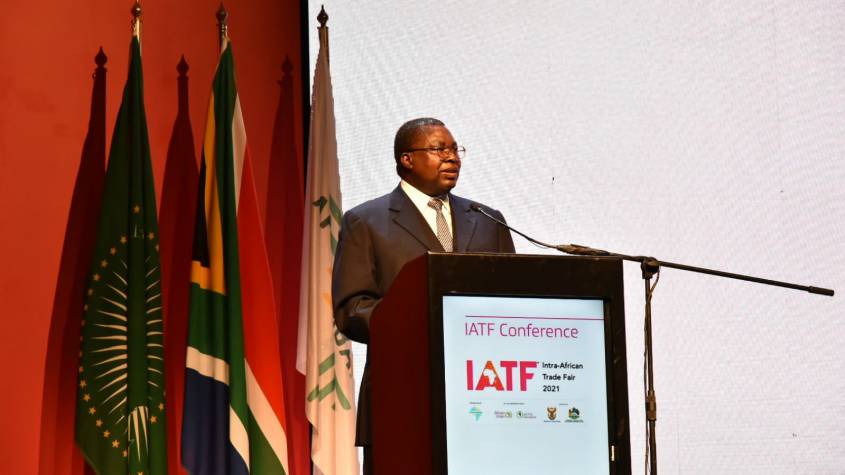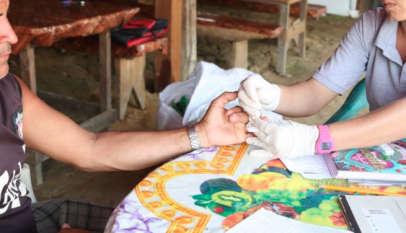EXCLUSIVE | “We’re developing ‘Made in Africa’ standard for trade under AfCFTA” – Albert Muchanga
Ambassador Albert Muchanga, the African Union Commissioner for Economic Development, Trade, Industry and Mining, speaks about the recently concluded 2nd Intra-African Trade Fair (IATF 2021) and the Africa Continental Free Trade Area (AfCFTA).

Newspage: What is the idea behind the Intra African Trade Fair (IATF)?
Muchanga: Trade fairs such as the Intra African Trade Fair (IATF) bring together buyers and sellers and accordingly, afford sellers the opportunity to exhibit their products to the buyers such that if the buyers are interested they will buy their products. In doing that, traders and buyers engage in Business-to-Business (B2B) transactions.
Before IATF, there was the All Africa Trade Fair being organized under the defunct Organization of African Unity (OAU) and which died off due to unfavorable economic conditions. So when I came to the African Union in 2017, one of my goals was to restart the All Africa Trade Fair; coincidentally, the Africa Export – Import Bank (Afreximbank) was at the time developing a concept paper on the Intra African Trade Fair.
After bilateral discussions between the AU and Afreximbank, a Memorandum of Understanding (MOU) was signed and the name Intra African Trade Fair (IATF) was subsequently adopted. Accordingly, the first edition of IATF was held in Cairo, Egypt in 2018 where we targeted 1,000 exhibitors and got over 1000 exhibitors and also targeted $25bn in B2B transactions but subsequently, $32bn worth of trade and investment deals were signed.
For the second IATF which was held in Durban, South Africa, US$42.1 billion worth of trade and investment deals were signed, against the pre-set target of US$40 billion. IATF 2021 attracted 1161 exhibitors against the targeted 1100 exhibitors. The IATF is a forum for exhibiting and showcasing products, exchanging of information and undertaking B2B transactions; it is a key component of trade development in Africa.
Newspage: Since we are in the era of the AfCFTA, is there a local content component to the IATF such that a certain percentage of the goods to be traded have to be Made-in-Africa products?
Muchanga: The idea of local content is very important. Under the AfCFTA, we are adopting a Rules of Origin (ROO) standard such that products to be traded freely across Africa have to meet certain ROO standards i.e they have to be made in Africa. If we do not take such measures, business persons will import products from outside Africa and label such products as ‘Made in Africa’ which will destroy our local industries.
As such we are coming up with what we will call the ‘Made in Africa’ standard. The first step towards achieving this is to agree on a quality policy document which has already been approved by the African Union Ministers of Trade (AMOT) and will be submitted to AU Heads of State and Government (HOSG) during the next summit in February 2022, for approval. Once approved, there will be a standard criteria for companies to meet before they are allowed to put the ‘Made in Africa’ insignia on their products.
Newspage: Pundits argue that mainstreaming women, youth and SMEs would make or mar the AfCFTA. What are you doing to ensure that African youths, women and SMEs benefit from the AfCFTA?
Muchanga: Under the AfCFTA Agreement which is being implemented by our colleagues at the AfCFTA Secretariat in Ghana, there is going to be a Protocol on Women and Youths, as a way of mainstreaming women, youth and SMEs. Beyond these legal provisions, we need to empower women and youths through capacity building. We have to ensure they are able to register their businesses, maintain books of account, and pay taxes to the state, as a way of formalising their businesses. All these activities are underway.
Newspage: For intra-Africa trade to happen, there has to be production. Africa’s productive capacity is currently very low due to infrastructure challenges. What are you doing to boost the continent’s productive capacity, as you promote intra-Africa trade?
Muchanga: Production is a key issue and the starting point is conducting a mapping exercise of continental and regional value chains so as to ascertain what each region of Africa can offer towards boosting our productive capacity. To this end, we are going to promote investment forums aimed at increasing trade in African manufactured, agro-processed as well as intermediate goods. In doing that, we will also be promoting inclusiveness such that each country will be an exporter as much as it is an importer of African-made goods so as to avoid dominance by certain countries.
Newspage: The AfCFTA will not work unless Africans are able to move freely across borders. Whereas AU member states have been enthusiastic about signing and ratifying the AfCFTA Agreement they don’t seem keen about the Free Movement of People (FMP) Protocol. What are you doing on this?
Muchanga: That is because of the low-level of economic development across member states, hence limited resources to share such as employment opportunities. A lot of governments are worried about allowing foreigners to come in because of the possibility of them taking over the business and employment opportunities of their people, hence their exhibiting protectionism. The answer to this is promoting rapid economic growth which will result in increased demand for goods and services and make member states eager to sign and ratify the FMP Protocol.
Editor’s note: This interview has been edited for length, clarity and flow.














